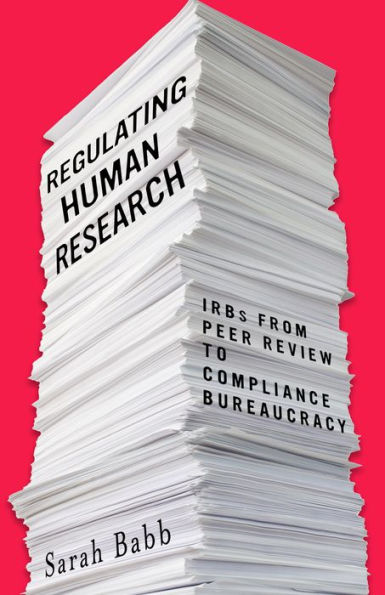Home
Regulating Human Research: IRBs from Peer Review to Compliance Bureaucracy
Barnes and Noble
Loading Inventory...
Regulating Human Research: IRBs from Peer Review to Compliance Bureaucracy in Franklin, TN
Current price: $95.00

Barnes and Noble
Regulating Human Research: IRBs from Peer Review to Compliance Bureaucracy in Franklin, TN
Current price: $95.00
Loading Inventory...
Size: Hardcover
Institutional review boards (IRBs) are panels charged with protecting the rights of humans who participate in research studies ranging from biomedicine to social science.
Regulating Human Research
provides a fresh look at these influential and sometimes controversial boards, tracing their historic transformation from academic committees to compliance bureaucracies: non-governmental offices where specialized staff define and apply federal regulations. In opening the black box of contemporary IRB decision-making, author Sarah Babb argues that compliance bureaucracy is an adaptive response to the dynamics and dysfunctions of American governance. Yet this solution has had unforeseen consequences, including the rise of a profitable ethics review industry.
Regulating Human Research
provides a fresh look at these influential and sometimes controversial boards, tracing their historic transformation from academic committees to compliance bureaucracies: non-governmental offices where specialized staff define and apply federal regulations. In opening the black box of contemporary IRB decision-making, author Sarah Babb argues that compliance bureaucracy is an adaptive response to the dynamics and dysfunctions of American governance. Yet this solution has had unforeseen consequences, including the rise of a profitable ethics review industry.
Institutional review boards (IRBs) are panels charged with protecting the rights of humans who participate in research studies ranging from biomedicine to social science.
Regulating Human Research
provides a fresh look at these influential and sometimes controversial boards, tracing their historic transformation from academic committees to compliance bureaucracies: non-governmental offices where specialized staff define and apply federal regulations. In opening the black box of contemporary IRB decision-making, author Sarah Babb argues that compliance bureaucracy is an adaptive response to the dynamics and dysfunctions of American governance. Yet this solution has had unforeseen consequences, including the rise of a profitable ethics review industry.
Regulating Human Research
provides a fresh look at these influential and sometimes controversial boards, tracing their historic transformation from academic committees to compliance bureaucracies: non-governmental offices where specialized staff define and apply federal regulations. In opening the black box of contemporary IRB decision-making, author Sarah Babb argues that compliance bureaucracy is an adaptive response to the dynamics and dysfunctions of American governance. Yet this solution has had unforeseen consequences, including the rise of a profitable ethics review industry.

















